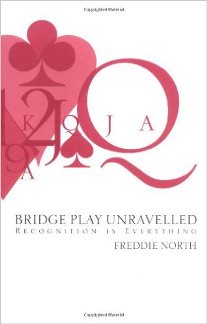Source: Mr Bridge; Freddie North is one of Britain’s most popular bridge writers.
Most hands that find their way into bridge columns are games, slams or sacrifices. Understandably, they are easier to write up than lowly part scores and, of course, invariably more sensational. Never-theless, every now and then an instructive little gem emerges and positively begs for an airing, even if just for once it pushes big brother out of the limelight.
Part-Score Hand
You might like to put yourselves in East’s shoes with this hand:
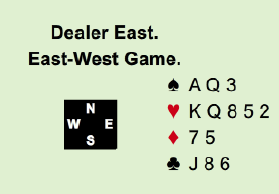
Not a great hand but of course, you are going to open. There is something to be said for 1NT (weak); right shape, right point count and solves the rebid problem. Against that — almost all the points are in two suits and at least there is a respectable five-card major. So you settle for 1 . The next hand passes and partner responds 1
. The next hand passes and partner responds 1 . RHO sticks his oar in with 2
. RHO sticks his oar in with 2 and you find yourself faced with another close decision. Should you rebid your hearts, support partner’s spades or Pass?
and you find yourself faced with another close decision. Should you rebid your hearts, support partner’s spades or Pass?
I think it is a close thing between 2 and Pass but you have a very minimum opening and have the opportunity to bale out, so perhaps it is right to take it. No matter whether you bid 2
and Pass but you have a very minimum opening and have the opportunity to bale out, so perhaps it is right to take it. No matter whether you bid 2 or Pass, South bids 3
or Pass, South bids 3 and everybody passes. This has been the bidding:
and everybody passes. This has been the bidding:
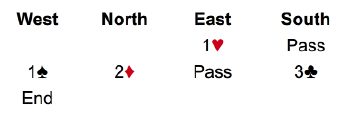
Partner leads the six of hearts and this is what you see.
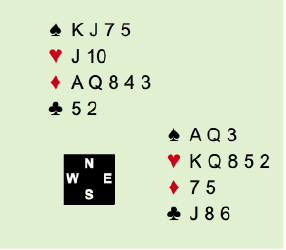
You cover dummy’s heart with your queen and declarer wins with the ace. Declarer plays the ace and another club, your partner following with the queen and then winning the second round with the king. At trick four, West switches to the eight of spades, five from dummy and you win with the queen, declarer contributing the ten. When you cash the jack of clubs, West discards the two of spades and dummy discards the three of diamonds. Then you cash the king of hearts, on which West discards the two of diamonds. This is the position from your point of view.
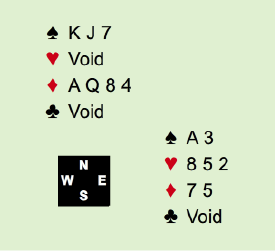
One More Trick Needed
You have four tricks in the bag and need only one more to defeat the contract, but you seem to be endplayed unless the ace of spades stands up. Partner has shown a singleton heart and a doubleton club so must have ten cards between spades and diamonds, but remember, he discarded the two of spades on the jack of clubs and he surely would not have done that with four spades and six diamonds. So you assume partner to be five-five in those two suits, which means that declarer has no more spades. Since you know he holds six clubs and five hearts, he must hold a singleton diamond. Oh dear! East cannot lead a spade, cannot lead hearts (the pips are too unfavourable) and certainly will not want to play right into the ace, queen of diamonds. So what is he to do?
Action at Trick Seven
If you have decided on your action at trick seven, let us look at this full deal.
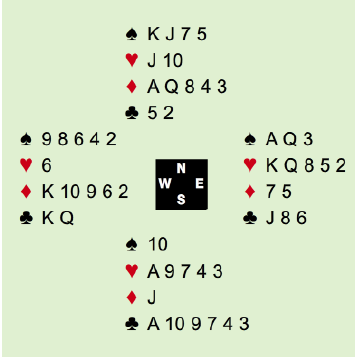
Unpalatable though it may seem, a diamond from East is the only way to avert a North-South plus score (Well done if you found it and I am sure you did as it really is the least of all evils). Yes, on the second round, declarer is able to discard a heart loser — the four —but then, when he returns to hand to play off his trumps and cash the nine of hearts, he has to concede the seven of hearts to East’s eight at trick thirteen.


